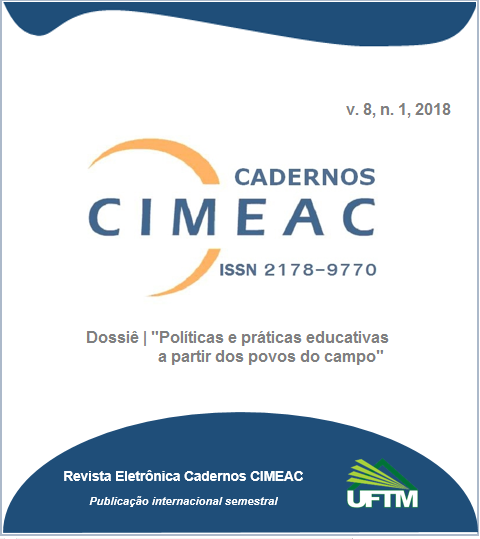Territórios existenciais da formação docente: expectativas e compreensões dos estudantes sobre o curso de licenciatura em educação do campo / Expectations and understandings of the students about the countryside education degree...
DOI:
https://doi.org/10.18554/cimeac.v8i1.2833Resumen
Neste artigo, trabalhamos com a perspectiva cartográfica dos territórios existenciais da formação docente, identificados a partir do curso de Licenciatura em Educação do Campo da Universidade Federal do Rio Grande (FURG), cujo objetivo é formar professores e gestores habilitados para atuar nos anos finais do Ensino Fundamental através de uma proposta pedagógica direcionada para a valorização da Educação do Campo. Aqui, apresentamos as expectativas e compreensões dos estudantes, obtidas através de uma análise cartográfica das entrevistas realizadas. A partir do dialogismo entre as falas dos sujeitos e o referencial teórico, identificamos a delimitação dos territórios existenciais habitados pelos discentes do curso. Verificamos o entendimento destes estudantes sobre a importância da formação de professores para o nível básico de forma exclusiva e direcionada para a atuação junto à Educação do Campo, dialogando com os autores específicos destas áreas. Finalmente, trazemos algumas considerações e possibilidades de uma abordagem de formação docente articulada às vivências dos discentes, que visam colaborar no quadro atual referente à formação de professores para a educação do campo.
Palavras-chave: Pedagogia da Alternância; Contextualização; Cartografia.
ABSTRACT: In this article, we work with a cartographic perspective of existential territories in teacher training, identified from the Teacher Training for Country Education Degree at the Federal University of Rio Grande - FURG, whose aims are to train teachers and managers qualified to work in basic education in the final years of Elementary School through a pedagogical proposal that meets the perspectives of educational scope, aimed at enhancing the education of the field through access to the university. Next, we present the expectations and understandings of the students, obtained through a cartographic analysis for the accomplished interviews. From the dialogism between the subjects' speeches and our theoretical references, we identify the delimitation of the existential territories inhabited by the students of the course. We verified the understanding of these students about the importance of teacher training for Basic Level in an exclusive way, directed to the action at Field Education, dialoguing with the specific authors of both áreas. Finally, we bring some considerations and possibilities of an approach of teacher formation articulated the experiences of the students, who aim to collaborate in the current framework regarding the training of teachers for the education of the field.
Keywords: Alternation Pedagogy; Contextualization; Cartography.
Descargas
Publicado
Número
Sección
Licencia
Os autores que publicam nesta revista concordam com os seguintes termos:
(a) Não cobramos dos autores para a publicação neste periódico.
(b) Autores mantém os direitos autorais e concedem à revista o direito de primeira publicação, com o trabalho simultaneamente licenciado sob a Licença Creative Commons que permite o compartilhamento do trabalho com reconhecimento da autoria e publicação inicial nesta revista.
(c) Autores têm permissão e são estimulados a difundir e a distribuir a versão publicada de seu trabalho online (ex.: em repositórios institucionais ou na sua página pessoal) após o processo editorial, já que isso pode aumentar o impacto e a citação do trabalho publicado (Veja O Efeito do Acesso Livre).
* * *
AUTHORS COPYRIGHT AND PUBLISHING RIGHTS
Authors who publish with this journal agree to the following terms:
(a) This journal does not charge authors for publication.
(b) Authors retain copyright and grant the journal right of first publication with the work simultaneously licensed under a Creative Commons Attribution License that allows others to share the work with an acknowledgement of the work's authorship and initial publication in this journal.
(c) For authors whose articles have been accepted: authors are permitted and encouraged to post their work online (e.g., in institutional repositories or on their website) after the publication of the text in Cadernos CIMEAC, as it can lead to productive exchanges as well as earlier and greater citation of published work (See The Effect of Open Access).

 10.18554/cimeac
10.18554/cimeac

